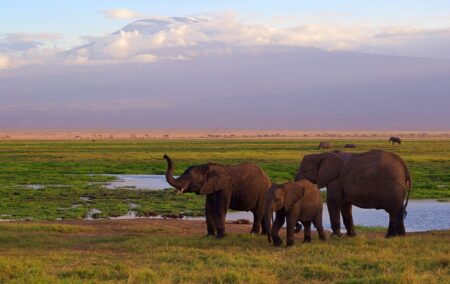The most terrible book I’ve ever read was The Mountain People (published in 1972) by Colin Turnbull, an anthropologist. His vivid, sympathetic writing makes his story all the more nightmarish. It is about the Ik people, an African tribe who had lived happily as hunter-gatherers in their ancestral land in Uganda.
They were kicked out when it was proclaimed a national park (a place for animals not humans, except for rich tourists with cameras), and forced into a desolate mountain range where they starved, degenerated under unspeakable deprivation, and lost their humanity. The book is particularly shocking if you had read his previous one, The Forest People, about Pygmies in the Congo, whom he described as living in harmony with nature and themselves, despite the inevitable brutality of hunting (and despite sexual attitudes that New York feminists might frown upon).
Both books point to Africa’s environmental quandary, the relationship between African people and African wildlife. The annihilation of Africa’s magnificent wild animals is perhaps the greatest ecological threat to our planet. They can only be saved if African people have the means and the desire to save them. This makes the recent persecution of Professor Nicoli Nattrass at the University of Cape Town (UCT) both absurd and tragic.
Pilloried as a racist
Nattrass is a distinguished Professor of Economics, with a particular concern about poverty and inequality. She made enemies among Mbeki supporters in the African National Congress (ANC) when her studies showed the madness of Mbeki’s stance on AIDS and its devastating economic consequences. She is interested in the two issues in the paragraphs above. Recently, she published a paper, ‘Why are black South African students less likely to consider studying biological sciences?’ She did an informal survey among 211 students, of whom just over half were black, asking highly pertinent questions such as, ‘Should national parks be scrapped and the land given to the poor?’ For these enquiries, Nattrass was pilloried as a racist.
At UCT, the Black Academic Caucus (BAC) condemned the university for allowing her ‘patronising and dehumanising’ research, which ‘might drive a white supremacist agenda’. Given UCT’s descent from liberal values and academic honesty, I shouldn’t be surprised if its leadership caves into the BAC and disciplines Nattrass. The Sunday Times, sliding with the media herd into wokeness, condemned Nattrass and made her ‘Mampara of the Week’.
To be properly woke, you are not allowed to disregard race; you must distinguish between white and black. But only in one way. You must always portray whites as masterful and evil, the cause of all the world’s problems, and blacks as helpless victims. If you make enquiries into any other differences, you are a racist. Nattrass looked at their ecological differences, and so was condemned.
A horrible killing
I have a personal interest, here. Fifty years ago, seeing a horrible killing of a wonderful wild animal, I resolved never to eat meat again, and have kept that promise. My hypocrisy gnaws at me. I eat fish and cheese and eggs, all associated with ghastly cruelty to animals. During these fifty years I have observed differences in meat-eating and ecological attitudes based on social class, wealth and race. It seems that far more middle-class people choose vegetarianism than working-class people; few blacks who can afford meat choose to abstain from it; the wealthy choose brown bread, the poor white bread, even if it costs more. We know such differences exist. Nattrass wanted to explore them.
Only those rich enough and secure enough can afford to care about the environment. Tens of thousands of years ago, when the first Homo sapiens reached Europe, lions ranged from England to Russia. The early Europeans, desperately poor, wiped them all out because they saw them as a threat to their survival. Today their rich descendants pay a fortune to visit African game parks and take pictures of lions. The European lions remain only in heraldry and legend.
If real African lions are to survive, along with elephants and rhino, the people of Africa must become rich. They must get modern technology, farming and energy. They must get capitalism, the only proven route to prosperity. But there will be a gap between their transition to prosperity and their attitudes to the environment. This happens to all people, and this is what Nattrass was trying to explore.
An abomination
The most appalling cruelty to animals ever was not among our hunter-gatherer ancestors, not among the Pygmies hunting today, not among our township people who have ritual slaughter of animals, but among modern European farmers. The battery farming of chickens is an abomination. These intelligent creatures, splendid in their natural state, are condemned from birth to a short hell on earth, knowing nothing but terror, pain, humiliation, disease and mutilation as they are crammed together in stinking Satanic sheds.
Europeans must not strike up any moral attitudes over Africans on animal welfare. That was not what Professor Nattrass was doing. She was just trying to investigate a question that holds the future of the African environment.
The views of the writer are not necessarily the views of the Daily Friend or the IRR
If you like what you have just read, subscribe to the Daily Friend

